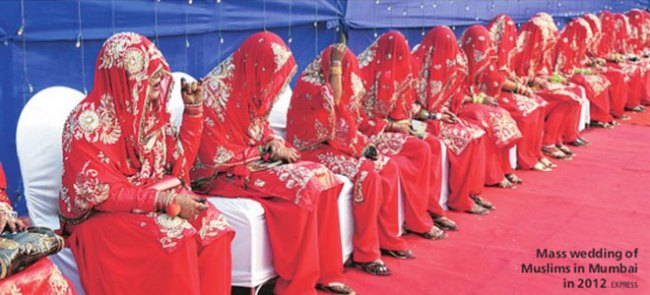Opinion For the Muslim woman,against arbitrary divorce
Petition in Madras HC challenges triple talaq and qazis' right to simply nullify marriages.

A public interest litigation admitted by the Madras High Court this month is being talked about as the spark that could bring that old chestnut,the way Muslim personal law is applied on women,back into the national limelight.
Filed by senior advocate Badar Sayeed,who was a Tamil Nadu MLA from 2006 to 2011,the petition argues for the need to codify Muslim personal law,calls for arbitration and witnesses before a marriage can be declared annulled,and challenges the triple talaq tradition.
The court has sent notices to the Centre,the secretary of the Tamil Nadu backward classes and minorities department,and the chief qazi of the state.
Sayeed has been under tremendous pressure to withdraw the petition and not undermine qazis publicly. With the petition she has appended several certificates issued by qazis in Tamil Nadu that arbitrarily decreed talaq as certified and formal. She has stressed that there should be a Muslim Marriage Bill like the Hindu Marriage Bill,so that Muslim women are no longer at the mercy of qazis. She points out that in no other faith can the priest solemnising a marriage simply nullify it.
I am not asking for a uniform civil code. But in my experience with several women as an MLA,as head of the state minorities commission and with my social work, says Sayeed,also the first woman to head the state Waqf Board,I see Muslim womens Achilles heel as being the ability of the qazi to simply,sometimes without even her knowledge,let alone with due process,decide that her marriage has been annulled.
Since her petition,some 100 persons have picketed outside her house in Alwarpet while several delegations from Muslim organisations have been pressuring her to withdraw it,anxious that the debate about qazis and Muslim womens rights doesnt play out in court.
I have been asked not to wash our dirty linen in public, she says. She adds that she has made it clear that she is keen that anyone who has arguments against her petition should take these up in court.
Her eight-page petition argues that the lack of codification has meant no set rules and convenient interpretations have enabled Muslim men to easily divorce without any consideration for the women they marry. The argument that it is anti-Shariah to question the triple talaq or procedures of divorce is an excuse for men to carry on.
How is asking for equal and a proper system for divorce for Muslim women and contesting the triple Talaq anti-Shariah? she says. I have been told by several people that asking for this codification means its a first step towards a uniform civil code. They have not understood what I am trying to do.
In 1986,when the Supreme Court ruled for extra maintenance for a Muslim divorcee,Shah Bano,Parliament came under severe pressure from Muslim clerics and was forced to overturn the judgment on the plea that it amounted to interference in Muslim personal affairs. The matter snowballed into a major political fault-line,coinciding with a BJP rath yatra.
Earlier this year,a group of lawyers and activists including the late Asghar Ali Engineer had argued for a fair and standardised nikahnama,which would take care of the concerns of Muslim women,often made to accept less favourable terms before the marriage,and later should it come to divorce. Sayeed says she was not part of that effort. But the scores of documents I have got,showing how qazis randomly accept whatever the mans side tells them and make divorce and abandonment of the woman so easy,have prompted me to ensure that Muslim women have access to the same legal safeguards as other women have. The Shariah is to be followed,but not randomly interpreted by qazis,but by courts, she says. The Qazis Act says clearly that they have no judicial powers, she adds.
The All India Muslim Personal Law Board is treading with caution. Says its spokesman,S Q R Ilyas,The petition is probably seeking to address problems that arise when some qazis behave inappropriately. The board will discuss what can be done. But we do not believe in codification as there is already a Shariah Application Act of 1937,which says that in all personal law matters it is the Shariah that will be applicable to Muslims. We do not want anybody to have the right to amend the Shariah,so we do not believe in codification by Parliament or any other body. Instead,we want a compilation of Islamic law. We brought out a compendium of Islamic law in 2001,which we are translating and which we want judges to consult before pronouncing on matters of personal Islamic law.
The board does not believe in arbitration or witnesses being mandatory for divorce. It is silent on the validity of the triple talaq,a matter that divides the community.
The petition wants this to be struck down as un-Islamic and invalid. But,says senior advocate M R Shamshad; Islamic law sets out preconditions for pronouncing talaq,and these need to be satisfied before the husband finally pronounces talaq.




